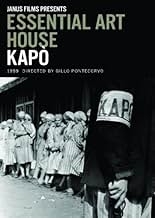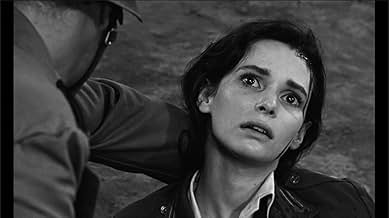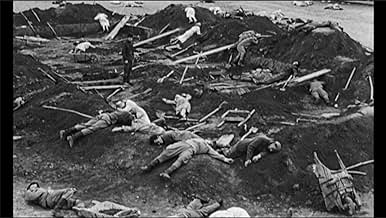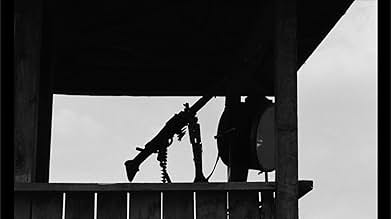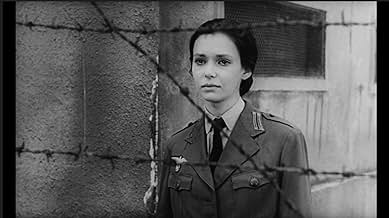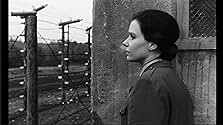Kapò
- 1960
- 1h 57min
NOTE IMDb
7,6/10
2,8 k
MA NOTE
Une jeune fille juive mène une tentative d'évasion d'un camp de concentration.Une jeune fille juive mène une tentative d'évasion d'un camp de concentration.Une jeune fille juive mène une tentative d'évasion d'un camp de concentration.
- Réalisation
- Scénario
- Casting principal
- Nommé pour 1 Oscar
- 3 victoires et 4 nominations au total
Semka Sokolovic-Bertok
- Une detenuta
- (as Semca Sokolovic)
Dirjana Dojic
- Ninette
- (as Dirjana Dojc)
Graziella Durano
- Une detenuta
- (non crédité)
Sima Janicijevic
- Il medico di Auschwitz
- (non crédité)
Rastislav Jovic
- Yanko Milovich
- (non crédité)
Dusan Perkovic
- Il commandante tedesco
- (non crédité)
Avis à la une
This film relates the story of a 14-year-old Jewish girl during her captivity in a Nazi concentration camp. Her role is portrayed by 21 year old Susan Strasberg who had portrayed Anne Frank on stage and Kim Novak's little sister, Millie Owens, in Picnic (1955). Kapò was nominated for an Academy Award for Best Foreign Language Film in 1960, when the Oscar went to Ingmar Bergman's The Virgin Spring.
In 1966, another Gillo Pontecorvo film---The Battle of Algiers--would be nominated in that same category. That year the Oscar went to A Man and a Woman. (I think that the Academy 'missed the boat THAT year!! The idea that The Battle of Algiers could be missed for its greatness is hard to imagine!)
As Kapò begins, Edith (Susan Strasberg), has just finished her harpsichord lesson and is going home when she sees her parents being arrested by the Nazis. When she runs to them, she too, is arrested. The family is transported in a boxcar to a concentration camp in Poland. Once there, the she is separated from her parents and taken to a separate cell block. Anxious to find them, she enters their cell block where we see the film's first terrible images of the over crowed and starving prisoners. While she is unable to find her parents, another female prisoner, Sofia (Didi Perego), sees her there and takes her to a camp doctor for help. Since Edith is new to the camp--and another girl her age had just died the night before--the doctor instructs her how to change her identity and be saved from certain death. As he explains, the prisoners are treated differently based on which patch they have on their smocks: a yellow Star of David indicates that they are Jews; a red patch (such as the doctor's) identifies them as political prisoners; and a black triangle indicates that they are criminals. The doctor tells Edith that she must cut her hair, change her clothes with those of the dead girl and take on a new identity, as Nicole Niepas, a non-Jewish criminal (with a black triangle on her smock).
Camp police (kapòs) are chosen from among the criminal group. They are hated by their fellow prisoners but useful to the SS officers who use them as their eyes and ears within the cell blocks. By being harsh on the other prisoners and reporting any resistance or planned insubordination to their Germans captures, the kapos are given special privileges such as food, clothing, and use of sanitary facilities. But, most importantly, if they do their jobs well, they are not likely to be exterminated with the other prisoners.
Later, Edith sees her parents being marched off to be killed in the gas chamber. With all hope lost, Edith (as Nicole Niepas) becomes a kapo. Her transformation from victim to 'victimizer' increases as she reports the activities of other prisoners and fraternizes with a German soldier in the camp. (She loses her virginity to one of the soldiers in the camp.) Her personal harshness is diminished when Russian POWs are taken to the same concentration camp and she falls in love with the Russian soldier, Sascha (Laurent Terzieff). As the Allies approach the camp near the end of the war in Europe, she agrees to take part in a daring escape plan. But, the as the plan takes shape, we realize that it is not totally without sacrifice..
In 1966, another Gillo Pontecorvo film---The Battle of Algiers--would be nominated in that same category. That year the Oscar went to A Man and a Woman. (I think that the Academy 'missed the boat THAT year!! The idea that The Battle of Algiers could be missed for its greatness is hard to imagine!)
As Kapò begins, Edith (Susan Strasberg), has just finished her harpsichord lesson and is going home when she sees her parents being arrested by the Nazis. When she runs to them, she too, is arrested. The family is transported in a boxcar to a concentration camp in Poland. Once there, the she is separated from her parents and taken to a separate cell block. Anxious to find them, she enters their cell block where we see the film's first terrible images of the over crowed and starving prisoners. While she is unable to find her parents, another female prisoner, Sofia (Didi Perego), sees her there and takes her to a camp doctor for help. Since Edith is new to the camp--and another girl her age had just died the night before--the doctor instructs her how to change her identity and be saved from certain death. As he explains, the prisoners are treated differently based on which patch they have on their smocks: a yellow Star of David indicates that they are Jews; a red patch (such as the doctor's) identifies them as political prisoners; and a black triangle indicates that they are criminals. The doctor tells Edith that she must cut her hair, change her clothes with those of the dead girl and take on a new identity, as Nicole Niepas, a non-Jewish criminal (with a black triangle on her smock).
Camp police (kapòs) are chosen from among the criminal group. They are hated by their fellow prisoners but useful to the SS officers who use them as their eyes and ears within the cell blocks. By being harsh on the other prisoners and reporting any resistance or planned insubordination to their Germans captures, the kapos are given special privileges such as food, clothing, and use of sanitary facilities. But, most importantly, if they do their jobs well, they are not likely to be exterminated with the other prisoners.
Later, Edith sees her parents being marched off to be killed in the gas chamber. With all hope lost, Edith (as Nicole Niepas) becomes a kapo. Her transformation from victim to 'victimizer' increases as she reports the activities of other prisoners and fraternizes with a German soldier in the camp. (She loses her virginity to one of the soldiers in the camp.) Her personal harshness is diminished when Russian POWs are taken to the same concentration camp and she falls in love with the Russian soldier, Sascha (Laurent Terzieff). As the Allies approach the camp near the end of the war in Europe, she agrees to take part in a daring escape plan. But, the as the plan takes shape, we realize that it is not totally without sacrifice..
Although it features two French leads (Laurent Terzieff and Emmanuelle Riva) ,"Kapo" has disappeared from the French dictionaries of films whereas lots of duds are included.
With the exceptions of "Nuit et Brouillard" (which was an exceptional documentary ) and Wanda Jakubowska 's "ostatni etap' (1947) there were few movies which at the time broached the concentration camps subject(the last scenes of Dmytryk's "young lions" ,1958)
Susan Strasberg was impressive ,mainly in the first hour though the evolution of her character is not always believable.Besides,her relationship with Sascha weakens the plot .
Emmanuelle Riva almost outshines Strasberg,maybe because she was a more experimented actress (she was featured in Resnais's "Hiroshima Mon Amour" ) and her scene when she is translating the German words in a voice chocked with emotion may be the strongest in the whole movie.
The "potato" scene is also revealing.I remember what Simone Veil ,a former French minister (secretary) (and herself a former prisoner in a concentration camp),said after watching the last episode of "Holocaust " (the seventies miniseries) : "in the camps ,people were not as helpful ,as kind ,as compassionate as they are in the film" ."Kapo" shows a very harsh world where the women are almost always fighting against their mates:that's the story of Edith /Nicole .
When it was released ,the movie was trashed by Jacques Rivette because of a tracking after Riva 's death ;at the time Nouvelle vague= intellectual dictatorship.Although defended by the Italian masters (including Visconti),the movie was cursed .The IMDb users have restored it to favor.
With the exceptions of "Nuit et Brouillard" (which was an exceptional documentary ) and Wanda Jakubowska 's "ostatni etap' (1947) there were few movies which at the time broached the concentration camps subject(the last scenes of Dmytryk's "young lions" ,1958)
Susan Strasberg was impressive ,mainly in the first hour though the evolution of her character is not always believable.Besides,her relationship with Sascha weakens the plot .
Emmanuelle Riva almost outshines Strasberg,maybe because she was a more experimented actress (she was featured in Resnais's "Hiroshima Mon Amour" ) and her scene when she is translating the German words in a voice chocked with emotion may be the strongest in the whole movie.
The "potato" scene is also revealing.I remember what Simone Veil ,a former French minister (secretary) (and herself a former prisoner in a concentration camp),said after watching the last episode of "Holocaust " (the seventies miniseries) : "in the camps ,people were not as helpful ,as kind ,as compassionate as they are in the film" ."Kapo" shows a very harsh world where the women are almost always fighting against their mates:that's the story of Edith /Nicole .
When it was released ,the movie was trashed by Jacques Rivette because of a tracking after Riva 's death ;at the time Nouvelle vague= intellectual dictatorship.Although defended by the Italian masters (including Visconti),the movie was cursed .The IMDb users have restored it to favor.
Edith is a Jewish teen whose family is among those loaded onto boxcars and shipped to Auschwitz. This is a story of brutality and Susan Strasberg ("Picnic") plays the central character who struggles to survive the Nazi holocaust machine.
Shot in black and white, of course, the film provides a stark and nearly unrelenting look at the depravity, deprivations, and degradations found in concentration camps. Strasberg is strong in her role, embodying the chameleon-like ability to change that gives her character a chance to survive, though survival has its price.
The action feels real, the locations feel real, and real emotions are evoked by this ambitious attempt to delve into the real human costs of barbarism---the loss of principles, the corruption of dignity, and the subtle shadings of resistance.
The Italian producers of this film pursued Strasberg for this role, somehow knowing that she had the depth within her to bring Edith to life on the screen. Her father, Lee, recommended she accept the role. Luckily, she did.
Shot in black and white, of course, the film provides a stark and nearly unrelenting look at the depravity, deprivations, and degradations found in concentration camps. Strasberg is strong in her role, embodying the chameleon-like ability to change that gives her character a chance to survive, though survival has its price.
The action feels real, the locations feel real, and real emotions are evoked by this ambitious attempt to delve into the real human costs of barbarism---the loss of principles, the corruption of dignity, and the subtle shadings of resistance.
The Italian producers of this film pursued Strasberg for this role, somehow knowing that she had the depth within her to bring Edith to life on the screen. Her father, Lee, recommended she accept the role. Luckily, she did.
A teen Jewish girl and her family are imprisoned in a concentration camp . There, the 14-years-old girl played by Susan Strasberg finds a harsh reality and changes identities with the help of the camp medic and rises to the position of Kapo. This is a good movie about the brutal existence at concentration camps and subsequent breakout from horrible place. This excellent movie deals about extermination center, abuse of camp guards or Kapos who enjoy their power, prisoners committing suicide and the subsequent getaway led by Laurent Terzieff and Russian prisoners . We see the horrors,murders,massacres against the prisoners and Nazis personify evil . Thus , when the incoming transports ,mostly Jews, SS soldiers made instant decisions,those who were fit to labors were sent into the camp, others including the children ,were dispatched immediately to the gas chambers.Finally the inmates broke out in a desperate riot that I believe it can be the concentration camp of Sorbibor, only in which Russian prisoners achieved to escape . The picture reflects perfectly the atrocities as a by-product of sheer Nazi evil . The flick is powered by splendid performances , as Susan Strasberg, -daughter of Lee Strasberg, creator of Actors studio- as suffering starring and Laurent Terzieff is watchable as obstinate Russian soldier wishing freedom. Appears as secondary actor playing a Nazi soldier Gianni Garco or John Garco, future Spaghetti Western hero named Sartana . Shot in magnificent black and white by Sekulovic and Carlo De Palma , Woody Allen's usual cameraman . Sensitive and atmospheric score by Carlo Rustichelli. The film achieved an Academy Award nominee for Best Foreign movie but lost to the ¨Virgin Spring ¨. This extraordinary and unknown film by one of the pioneers of political film , he always interesting director Gillo Pontecorvo. It was one of the first films about the theme of Jewish holocaust and one of the more realistic in its recreation . Gillo subsequently will directed ¨Battle of Argel¨ and ¨Queimada¨.
The picture is based on real events and survivor's memories,these are the following : The large death camps were transformed into extermination centers to implement the policy of genocide thought at the Wannsee Conference (1942). There was some minor industrial activity linked to the war effort but the main work was the execution of inmates (as happen with the starring's family) . Victims (as Susan Strasberg and her parents) were brought to the camp in unventilated transports, and all but a handful were gassed after arrival,the gas chambers could accommodate hundred prisoners at one time using Zyclon B which was a crystallized prussic acid which dropped into death chamber ,most of their corpses were burned in open pits (as occurs at the ending of the movie when is opened a large hole to bury unfortunates).
The picture is based on real events and survivor's memories,these are the following : The large death camps were transformed into extermination centers to implement the policy of genocide thought at the Wannsee Conference (1942). There was some minor industrial activity linked to the war effort but the main work was the execution of inmates (as happen with the starring's family) . Victims (as Susan Strasberg and her parents) were brought to the camp in unventilated transports, and all but a handful were gassed after arrival,the gas chambers could accommodate hundred prisoners at one time using Zyclon B which was a crystallized prussic acid which dropped into death chamber ,most of their corpses were burned in open pits (as occurs at the ending of the movie when is opened a large hole to bury unfortunates).
I've never really liked holocaust flicks because they get well, usually made so that the dumbest of the dumb to 'get it.' Kapo is just a movie that shows, not tells, which of course makes the best story. Thanks to TCM for playing this gem that I'll buy on DVD as soon as it comes out. I'd never even heard of it, and I have seen a LOT of flicks.
Susan Strasburg does an incredible job as Nicollete / Edith. Her transformation from shell-shocked victim to cynical survivor is absolutely gripping. The tension in the movie builds to nearly unbearable level and the end simply leaves you scooping your jaw off the floor.
This is the type of movie I sorely needed after going on a loooong dry spell of celluloid garbage. Why this movie isn't famous, I have no idea, but it should be.
Susan Strasburg does an incredible job as Nicollete / Edith. Her transformation from shell-shocked victim to cynical survivor is absolutely gripping. The tension in the movie builds to nearly unbearable level and the end simply leaves you scooping your jaw off the floor.
This is the type of movie I sorely needed after going on a loooong dry spell of celluloid garbage. Why this movie isn't famous, I have no idea, but it should be.
Le saviez-vous
- AnecdotesThe producers imposed a romance line in the story and also another ending, different from the one Pontecorvo, the director, wished to shoot.
- GaffesIn the opening scene, Edith walks past some shops on her way back home. One of the shops look like it belongs to the booming 1950s than the more austere WWII period. There is a toy car or baby push car in the store window that shows the typical car design of the 1950s.
- Citations
Edith, alias Nicole Niepas: [to Sasha] Your mother won't like me, I'm not a good girl, and my name's not Nicole, I'm a Jew.
- ConnexionsFeatured in Pontecorvo: The Dictatorship of Truth (1992)
Meilleurs choix
Connectez-vous pour évaluer et suivre la liste de favoris afin de recevoir des recommandations personnalisées
- How long is Kapo?Alimenté par Alexa
Détails
- Durée
- 1h 57min(117 min)
- Couleur
- Mixage
- Rapport de forme
- 1.66 : 1
Contribuer à cette page
Suggérer une modification ou ajouter du contenu manquant


